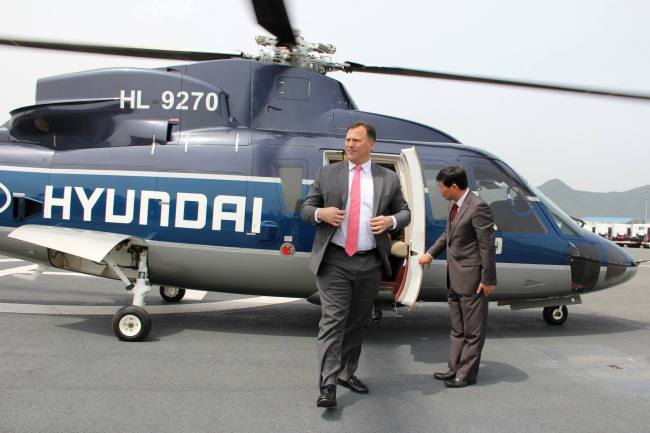Paraguay’s new businessman-turned-president wants to make history by transforming the tiny, underdeveloped and landlocked South American country into an advanced nation and regional logistics hub, said the country’s minister of industry and commerce.
“We have a pragmatic president, and he has a new vision for the country,” Ramon Jimenez Gaona, minister of public works and communications, said in an interview with The Korea Herald at a hotel in Seoul on Wednesday. “He wants to make history, and he has chosen a young cabinet. Everyone speaks English and studied overseas.”
That energetic outlook was reflected in the visit of Jimenez Gaona in Seoul last week. He conducted a battery of meetings with prospective foreign investment partners in an unprecedented infrastructure development push by his country, adding that most of the rest of the cabinet was “about my age” and just as energetic, he said.
 |
| Minister of Public Works and Communications Ramon Jimenez Gaona exits a Hyundai corporate helicopter last week after a series of meetings in South Korea with Hyundai executives on prospective public-private partnership deals that could be worth billions of dollars. (Paraguayan Embassy) |
The 44-year-old met with representatives from every major Korean conglomerate including Hyundai, as well as scores of other South Korean companies during his five-day trip here. But it was not his first time here. He represented his country in track and field in the 1988 Summer Olympics in Seoul.
He said Paraguay aims to invest $7.5 billion in infrastructure development over the next five years. “That is unprecedented for Paraguay, a country that spent an average of $200 million in infrastructure over the last 12 years (annually until 2013).”
Paraguay’s new president is one of the nation’s wealthiest men, the tobacco magnate Horacio Cartes, who was elected last April on promises of reducing poverty by promoting private investment to create jobs with conservative, business-friendly policies during his campaign. Following his inauguration in August, he pushed for and got the passage of so-called public-private partnership legislation in October.
Paraguay is about the size of California, sandwiched between southern Brazil and northern Argentina, with a population of 6.5 million. After recovering from a slump in 2012, the Paraguayan economy surged 14 percent in 2013, and on-year growth in the first quarter of 2014 was estimated at 14 percent.
“To continue this progress we must address the country’s infrastructure, he said. “We are facing a significant constraint because of the lack of infrastructure.”
At least one South Korean corporation, Ilsung Construction, sees opportunity in Paraguay. It inked a deal to build a new 72-kilometer expressway in a plush signing ceremony in April.
By Philip Iglauer (ephilip2014@heraldcorp.com)

